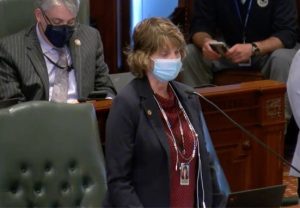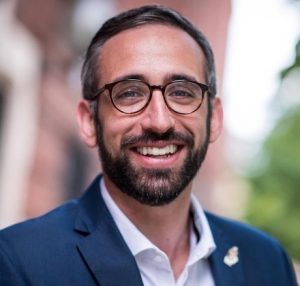Bill calls for reimbursing teachers for college tuition, fees
By Grace Kinnicutt Capitol News Illinois — March 3, 2022

State Rep. Sue Scherer, D-Decatur, discusses House Bill 4139, a measure that would require the Illinois Student Assistance Commission to establish and administer a teacher reimbursement grant program. The program would provide eligible applicants an annual reimbursement of tuition and fees paid towards higher education. (Blueroomstream.com)
SPRINGFIELD – The Illinois House passed a bill Wednesday, March 2 that would reimburse public school teachers for tuition and mandatory fees paid to a public institution of higher education.
The measure is intended to promote the retention of teachers, but Republicans said it would skew toward the benefit of wealthy students whose parents paid for their education.
In a 70-42 vote, with no Republican support, the House passed House Bill 4139, which would require the Illinois Student Assistance Commission to establish and administer a teacher reimbursement grant program that provides eligible applicants an annual reimbursement of tuition and fees.
Rep. Sue Scherer, D-Decatur, said the bill addresses a dire need for teachers and incentivizes teachers to remain in Illinois public schools for at least 10 years.
“I’m a retired teacher of 35 years, and my heart is broken when I go to high schools in my community,” Scherer said. “I see a gymnasium full of students without teachers because it seems to me many people have a reason to turn a blind eye to the teacher shortage.”
To be eligible for reimbursement, applicants must have attended a public Illinois university and completed a state-approved educator program. Scherer said while they are employed at an Illinois public school, they will get reimbursed one-tenth of the amount they paid in tuition and fees for up to 10 years.
To receive reimbursement, applicants would need to provide documentation of the total amount of tuition and mandatory fees paid and would be reimbursed for up to eight semesters or 12 quarters. Tuition and fees beyond the eight semesters or 12 quarters would be ineligible for reimbursement.
If the grant program were to serve everyone eligible, it would require about $1.4 billion over 18 years, according to a fiscal note attached to the bill at the request of a Republican lawmaker. In fiscal year 2023, it would cost about $88.3 million altogether and grow each year until annual costs peaked in years nine and 10 at about $140.2 million and declining thereafter. It would impact an estimated 65,160 Illinois teachers, including an estimated 53,460 current teachers.

Will Guzzardi, D-Chicago
The bill does not appropriate any money for the program, however, so lawmakers would have to include funding in future state budgets for it to have any effect.
Scherer said the reimbursement program is modeled after a 1970s program.
Illinois State Board of Education data shows that there are 1,703 unfilled teaching positions across 852 school districts in Illinois.
Rep. Kelly Cassidy, D-Chicago, said as someone who comes from a family of teachers, she has heard from her siblings how the shortage has impacted their ability to do their job. Cassidy noted that private sector companies have used tuition reimbursement as an incentive to hire workers.
Rep. Avery Bourne, R-Morrisonville, noted that ISAC had concerns about the bill and filed a witness slip in opposition to it. She requested the fiscal note on the bill which showed the billion-dollar price tag.
Bourne said due to the lack of income requirements in the bill, state taxpayers could be on the hook for tuition that a wealthy family member had already paid to the public university. For that reason, she said. the bill does not help the people it is intended to help.
She said it is an inequitable way of encouraging students to go into the education profession.
The bill is supported by the state’s major teachers unions.
Will Guzzardi, D-Chicago, noted that while there are many reasons for the teacher shortage, the pandemic has “added fuel to the fire,” and Scherer’s bill would be another opportunity to provide support to teachers.
The 2021 Illinois Educator Shortage Survey released by the Illinois Association of Regional Superintendents of Schools shows that the pandemic has led to a decrease in the number of educators employed.
Guzzardi said that the shortage has led to substitute staffing problems throughout schools in his district. In the IARSS educator survey, 80 percent of responding districts said they have used an existing teacher during their prep time as a substitute in other classes.
“I have principals who are going into the second-grade classroom and teaching second grade because they just can’t get enough substitute teachers to cover,” Guzzardi said.
Rep. Jeff Keicher, R-Sycamore, said the bill creates confusing rules that will reward rich students whose parents are paying for their education.
Keicher said the option of expanding the existing Golden Apple program and other state incentives should have been considered before lawmakers create a new grant program.
The Golden Apple Scholar program is a teacher preparation and scholarship program for high school seniors, as well as first- and second-year Illinois college students.
The bill now heads to the Senate for further discussion.
gkinnicutt@capitolnewsillinois.com







